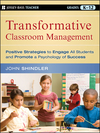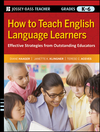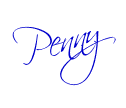 | Transformative Classroom Management: Positive Strategies to Engage All Students and Promote a Psychology of Success John Shindler ISBN: 978-0-470-44843-4 Paperback 384 pages December 2009 US $29.95 |
Click on the photo of the book to take you to a page where you may peek inside it.
The authors offer free articles here and as I begin to write about the book, I want to spotlight a concept (#9) from the book/author web site:
Promotes a “psychology of success” rather than a “psychology of failure.” Most classroom practices actually promote a failure orientation in students. TCM outlines those practices that promote a healthy learner and those that undermine this effort.
That's what *I* want for my children. I want all of us to have that at home. I want my children to experience that at school. I want the teachers of my children (myself included - I am a homeschooler to one, after all) to understand "Transformative Classroom Management".
Transformative Classroom Management isn't a book that teaches us how to "get" something from our children, our students. It's a book about how to use ourselves differently to bring success to the classroom and to our students. Dr Shindler teaches us about motivation, intrinsic and extrinsic, which is more effective and the "how to" behind the effectiveness.
Some individuals understand how to promote a "psychology of success" quite naturally. My daughter's skating coach is one of them. I have learned so much from watching her work with my child. She's an incredible teacher for me.
At home, I recognize some patterns of interaction that are negative, some circles that I'd like to set spinning into a different, more postive motion, and Dr. Shindler gives me fuel for thought and action as a parent.
I know I have room for improvement (a gross understatement), and as I read the pages from this book, I grow in self-awareness as a parent and am able to identify some places at home that need changes, and I am given some tools that help me begin to shift how I use myself in situations. (Doesn't hurt that it fits with our RDI(r) philosphy.)
The table of contents of "Transformative Classroom Management" is exciting to me. Please take a peek.
This one's a book that appears to be written for school-building staff members, and my opinion is that it has a much broader audience. Anyone who interacts with students in any setting, home, Sunday School, day care, homeschool, homeschool co-op, you name it, will benefit from the information, the research, the illustrative anecdotes, case studies and questions for reflection that Dr. John Schindler provides.
A sample chapter is available HERE.
This book, for the most part, is written with typically developing children in mind. My experience using a developmental remediation approach to autism tells me that many of the strategies described in this book will work with *any* student if applied in a developmentally appropriate frameworok. Chapter 14, "Changing the Negative Identity Pattern and Succeeding with More Challenging Student Behavior" addresses ADHD, particularly, page 291-293, section 14.16, "Level III Conditions and Supporting Students with ADHD".
I recognize some of the stories inside. I recognize them because I hear from parents of children who are considered "problems" at school, where the parents believe the classroom management is the problem. Transformative Classroom Management is another one that parents who wrestle with school staff are likely to want to buy in bulk so that they can gift copies to teachers.
Click on the photo of the book to take you to a page where you may peek inside it.
This title interests me because I have often said that I suspected my child w/ an autism spectrum disorder diagnosis was learning English almost as a second language. Her babbling and jargon was different from other children, as if she were hearing different spoken sounds. As I watch her and other children like her struggle with language development, I often wonder if there are strategies we can borrow from professionals who teach ELL whose first language is not English.
I sometimes (okay, often) read (sometimes skim) a non-fiction book from the back to the front first. The last chapter, "Conclusion: Putting It All Together" happens to be an incredible wealth of information for not only teachers of ELL but all teachers, even parents in homeschool settings.
This book uses "vivid portraits of effective teachers at each tier of the Response to Intervention model." (p 161) The authors do a nice job using anecdotes to illustrate the concepts, with "Stop and Think" bubbles along the way to spotlight for readers/teachers the "why bother" and "how might you apply this concept?". The authors know the obstacles to teaching ELL in a big classroom and offer strategies about how to give the needed attention and individualization to the students who need it. I like the emphasis on the importance of including the parents of the students in learning.
The table of contents is HERE and a sample from a chapter is HERE.
How To Teach English Language Learners is aimed at exactly what the title describes, and yet, it contains information that is supportive and encouraging to any teacher.
 Teacher Collaboration for Professional Learning: Facilitating Study, Research, and Inquiry Communities
Teacher Collaboration for Professional Learning: Facilitating Study, Research, and Inquiry Communities Cynthia A. Lassonde, Susan E. Israel, Janice F. Almasi (Foreword by)
ISBN: 978-0-470-46131-0
Paperback
208 pages
December 2009
US $30.00
Click on the photo of the book to take you to a page where you may peek inside it.
One of the schools my daughter attended prior to becoming homeschooled practiced a staff collaboration. That school was the best of all the schools she attended prior to my withdrawing her. The principal was an advocate of collaboration and found a successful model to use at her school. And it worked.
I suspect that teachers like the many positive outcomes of collaboration. They grow peer relationships, they develop professionally, they become better teachers, and their students benefit.
I also suspect that there are enough negatives to the practice of collaboration that discourage schools from using it. How does a group organize and begin? How does a group focus? How does the group maximize time? Teachers have lives outside the classroom, and wasting time on the planning, scheduling, group bonding/dynamics, personalities, obstacles and roadblocks can make a group ineffective or stop it before it begins.
Potential collaborative groups need a model. A guide. Words of wisdom from folks who've walked this road ahead of them. Two authors, 31 contributors - "Teacher Collaboration for Professional Learning" is packed with experience from educators.
"Teacher Collaboration for Professional Learning" is a book that has a more limited audience, one that teachers and school-building staff will appreciate, and it's a book that describes the team-approach that so many parents wish their school staff members would implement at their schools in an effort to make improvements in the classroom.
Cynthia A. Lassonde and Susan E. Israel provide the "why bother" and "how to" of collaborative research for teachers and school staff members. The authors and contributors provide an amazing amount of guidance to help school staff begin and complete collaborative research, including the sometimes tricky element of group dynamics and helping a group troubleshoot potential obstacles from the get-go. The appendices are a wealth of practical information: The authors provide all of the forms a group might need in Appendix A; questions for reflection in Appendix B; group exercises, resources and a survey in other appendices.
The table of contents is HERE. A sample chapter is HERE for readers who would like to look inside.
Stay tuned - I have a new book about dyslexia from Jossey Bass Teacher. Information coming shortly.
Jossey-Bass, an Imprint of Wiley, sent me these three books (at no charge) to review on my blog. I received no compensation.



2 comments:
Hi Penny
I couldn't find a contact me link, but I wanted to ask you what curriculum(s) you use to homeschool?
I want to start. My kid is 4 (ASD).
Stranded, e-mail me at bubbetta at hotmail dot com -- let's chat. I'm not so much using a curriculum as a philosophy. Ruth Beechick's book about the 3R's was a helpful starting point for me, and I am reviewing a huge product from long ago that is quite helpful as I think about how to homeschool my child w/ asd.
Post a Comment